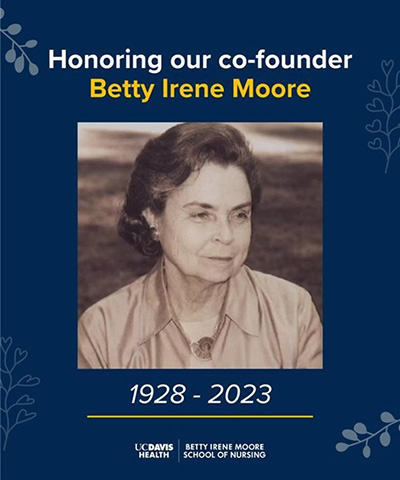Betty Irene Moore’s legacy lives on
 Tuesday morning the world lost an incredible philanthropist and patient advocate Betty Irene Moore. She, along with her late husband Gordon Moore, established the Gordon and Betty Moore Foundation in 2000. They believed in the importance of science. It was from Mrs. Moore’s own background as a caregiver — and a patient who experienced preventable harm during a hospital stay — that prompted their desire to develop nurses as leaders. In 2009, their $100 million committed founded the Betty Irene Moore School of Nursing at UC Davis.
Tuesday morning the world lost an incredible philanthropist and patient advocate Betty Irene Moore. She, along with her late husband Gordon Moore, established the Gordon and Betty Moore Foundation in 2000. They believed in the importance of science. It was from Mrs. Moore’s own background as a caregiver — and a patient who experienced preventable harm during a hospital stay — that prompted their desire to develop nurses as leaders. In 2009, their $100 million committed founded the Betty Irene Moore School of Nursing at UC Davis.
Now nearly 15 years later, her vision of nurse leaders, health care change agents and optimal health for all lives on through the people, programs and plans of the school I now have the privilege to lead.
Last night, 41 graduates from the Master’s Entry Program in Nursing celebrated the conclusion of their 18 months of study with a traditional pinning ceremony. Nurses will know the significance of having a personally chosen individual pin you. The tradition dates back to the 12th century when knights cared for the injured and suffering crusaders. Then during the Crimean War, Florence Nightingale earned the red cross of St. George. By the early twentieth century, it was tradition to mark nurses’ transitions from school to practice with the symbol. The pins they received last night signal to the world that they are now part of the noble and honorable profession of nursing.
They enter a workforce that faces a momentous nursing shortage and growing technological changes. That shortage has highlighted the critical need to pay greater attention to their mental health. Health systems will need to prioritize those needs so that stress, fatigue and burnout don’t continue to take a toll.
Thankfully, the Class of 2023 consists of not just future registered nurses, but Betty Irene Moore nurses. They will make their mark in health care as nurses who will make a difference as leaders, problem solvers and change agents. They will provide person-centered care with a perspective unique to their innovative education here.
As they set off to achieve their dreams, our future advanced practice providers transition into a critical part of their preparation as future providers. Last month, physician assistant (P.A.) and nurse practitioner (N.P.) students (from our new Doctor of Nursing Practice — Family Nurse Practitioner degree program), received their white coats. The event marks their entry into the patient-facing aspects of health care education.
White coat ceremonies began in 1993 with the belief that medical students should recognize the standards and responsibilities before they began formal training. The tradition expanded to a variety of other health professions such as pharmacy, optometry, veterinary, P.A. and N.P. and is now celebrated internationally. While these students will not enter the workforce for another 18 to 20 months, they have committed, as Hippocrates said, to “lead their lives and practice their art in uprightness and honor.”
These are commitments upheld by the incredible faculty and staff at the School of Nursing. I am incredibly grateful for their unwavering support of our students. Our shared mission guides how we teach, what we teach and the experiences inside and outside of the classroom to which students are exposed.
That vision also undergirds our role as an indispensable partner in UC Davis Health. Our graduates proudly call themselves UC Davis Health employees. Our clinician educators welcome the opportunity to both precept students and expand access to UC Davis Health patients. We recognize that our involvement is vital to provide tomorrow’s health care today. We consistently strive to find new ways to contribute to this incredible enterprise.
An old Chinese proverb says: “Teachers open doors, but you must enter by yourself.” Our hope at the School of Nursing is that our students — and graduates — lean into the dynamic nature of the professions they have chosen. They have the knowledge to address social determinants of health to advance equity for the long term. They understand the importance of approaching their patients with cultural humility. And they recognize the imperative of a workforce that embraces diversity, equity and inclusion in its people and its practices.
Gordon and Betty Irene Moore dedicated their lives to tackling “large, important issues at a scale where it can achieve significant and measurable impacts.” The tremendous impact of their generosity remains our call to improve the human condition, drive bold change in health care and create optimal health and health care equity for all.





